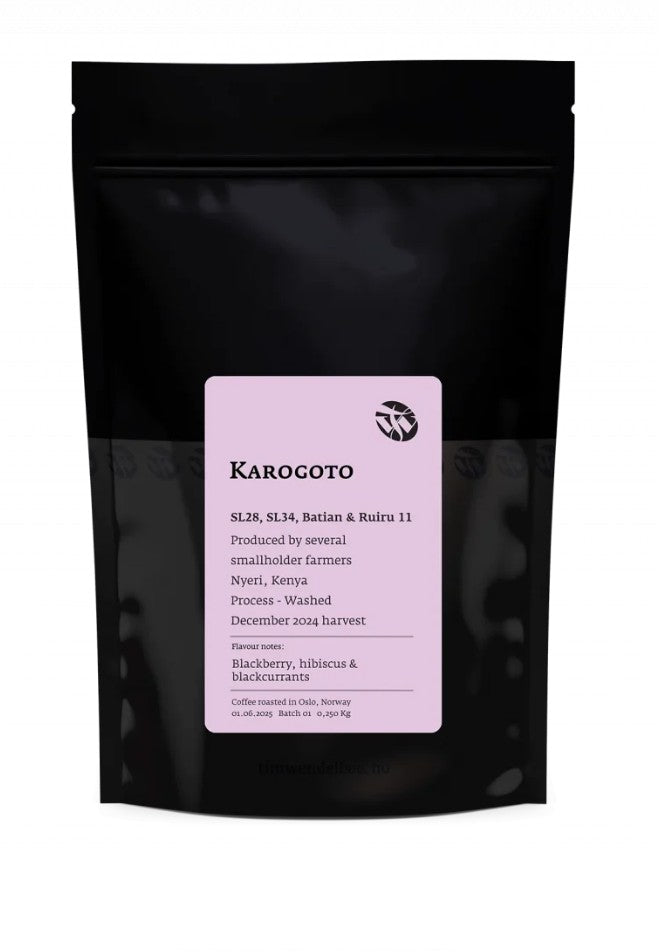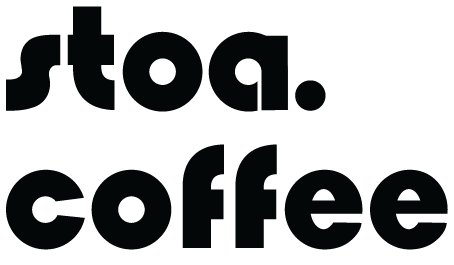stoa coffee
Tim Wendelboe - Karogoto - (Kenya, Washed, SL28/SL34/Ruiru11/Batian)
Tim Wendelboe - Karogoto - (Kenya, Washed, SL28/SL34/Ruiru11/Batian)
Couldn't load pickup availability
Tasting Notes: Blackberry, Hibiscus, Blackcurrants
This Kenyan coffee from the Karogoto wet mill, has a very distinct and intense fruity flavour with a refreshing acidity. Expect notes of rose blackberry, hibiscus and blackcurrants.
Cultivar
SL28, SL34, Ruiru 11 & Batian
Flavour Notes
Blackberry, hibiscus & blackcurrants
Producer
Several smallholders farmers
Country
Kenya
Region
Nyeri
Process
Washed
Harvest
December 2024
Roast Profile
Light Roast
Contents
Whole Coffee Beans
Bag Size
250g
Tim's Notes
The coffees from Karogoto are always super clean and have an intense fruity and floral flavour. This is most likely because many of the members/farmers are still growing the SL28 cultivar and have received a lot of agricultural training over the years. The climatic conditions also contribute to the coffees intensity. The cool nights and moderately hot days slow down the ripening process and give a very sweet, intense and unique coffee.
This year we bought two different lots from Karogoto with slightly different flavour profiles. First up is a lot that tastes really ripe and fruity like blackberry and blackcurrants probably due to a slightly prolonged fermentation. The other lot is more like the classic coffees from Karogoto which tend to have a lighter body and high acidity with tart rose hip flavours. This demonstrates that even though the coffees from Karogoto tend to be quite consistent in quality there are always small variations in flavour profiles depending on the quality of the coffee cherries they receive from the farmers. Also the differences in lot size will affect the processing protocols and especially the fermentation time.
Cultivar
This coffee is produced by several hundred farmers, most of them growing the famous Kenyan SL28 and SL34 cultivars. While some have planted newer hybrids like Ruiru 11 and Batian you can clearly taste the clean and fruity flavours in this coffee that are so common for the SL cultivars.
Process
Picking and sorting
- The coffee cherries are typically hand picked by the farmers and their family members. After delivering the coffee cherries to the wet mill the good coffee cherries are separated from the inferior ones by hand sorting and they are delivered in separate cherry hoppers.
Depupling, fermenting & washing
- The cherries are depulped and graded by using an old Aagard disc de-pulper that uses water and gravity to sort dense beans from less dense beans. Coffee of different grades are moved to separate fermentation tanks where the parchment coffee, with it’s mucilage still on, is dry fermented for about 12-16 hours over night. After fermentation the coffee is washed in clean water and graded once again by gravity. The more dense beans are dried separately from the beans with lower density and inferior quality.
Drying
- The coffees are dried on elevated drying tables, where defect parchment coffee gets sorted out by hand. Drying the coffee takes about 10 – 14 days. During daytime the coffees are raked to ensure even drying. The drying tables are covered during the hottest times of the day to avoid over heating and also at night time to prevent condensation. The drying process is finished when the moisture content in the coffee beans is between 10-12%. After drying, the coffees are stored in conditioning bins before delivery to the dry mill. The coffees we buy from Kenya are always vacuum packed before it is shipped to Norway.
Karogoto
Karogoto is a wet mill (also called factory) situated near Karatina town in Nyeri, Kenya. It is one of four wet mills that are owned by the Tekangu farmers cooperative society. There are numerous wet mills in Nyeri often just a few minutes drive from one to another. The reason for this is that Nyeri is home to thousands of smallholder farmers that owns on average 0,5 hectares of land where they typically grow coffee, maize, pasture and other crops. A farmer typically will pick her/ his coffee cherries and sell them to the nearest wet mill that is within walking distance. The cherries get bulked together before they are processed and dried by the staff on a cooperative wet mill and later sold to exporters at the weekly Kenyan coffee auction or directly to roasters. Kenya is both a complicated and a very streamlined place to buy coffee. Unlike the origins we buy from in the Americas, it is slightly more challenging to find farmers that own enough land to be able to supply even small roasters like us. Most smallholder farmers sell their coffee to cooperatives and do not process or dry their own coffees.
Share


